
Western Sahara is a disputed territory in North-western Africa. It has a surface area of 272,000 square kilometres (105,000 sq mi). Approximately 30% of the territory is controlled by the Sahrawi Arab Democratic Republic (SADR); the remaining 70% is occupied and administered by neighboring Morocco. It is the most sparsely populated country in Africa and the second most sparsely populated country in the world, mainly consisting of desert flatlands. The population is estimated at 618,600. Nearly 40% of that population lives in Morocco-controlled Laayoune, the largest city of Western Sahara.
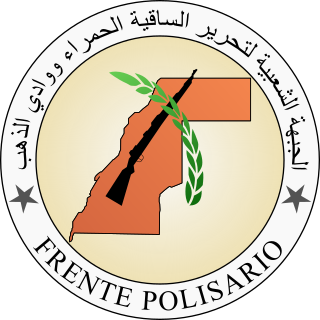
The Polisario Front, Frente Polisario, Frelisario or simply Polisario, is a Sahrawi nationalist liberation movement seeking to establish a Sahrawi Arab Democratic Republic for the Sahrawi people through the means of self-determination and armed resistance in the disputed territory of Western Sahara.

The United Nations Mission for the Referendum in Western Sahara is the United Nations peacekeeping mission in Western Sahara, established in 1991 under United Nations Security Council Resolution 690 as part of the Settlement Plan, which had paved way for a cease-fire in the conflict between Morocco and the Polisario Front over the contested territory of Western Sahara.

Scouting exists in Western Sahara both as part of the Fédération Nationale du Scoutisme Marocain as well as independent groups.

Sahrawi Youth Union, also known by its Spanish acronym UJSARIO, is the youth organization of the Polisario Front.
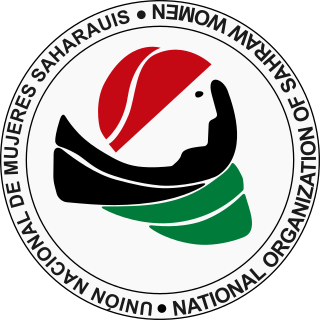
The National Union of Sahrawi Women is the women's wing of the Polisario Front. It was created in 1974, and claims to have 10,000 members, divided between the Sahrawi refugee camps, the Liberated territories, the Moroccan-occupied part of Western Sahara and the Sahrawi diaspora.
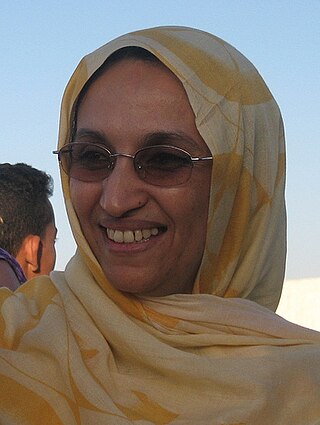
Aminatou Ali Ahmed Haidar, sometimes spelled as Aminetou, Aminatu or Aminetu, is a Sahrawi human rights activist and an advocate of the independence of Western Sahara. She is often called the "Sahrawi Gandhi" or "Sahrawi Pasionaria" for her nonviolent protests. She is the president of the Collective of Sahrawi Human Rights Defenders (CODESA). She was imprisoned from 1987 to 1991 and from 2005 to 2006 on charges related to her independence advocacy. In 2009, she attracted international attention when she staged a hunger strike in Lanzarote Airport after being denied re-entry into Moroccan Western Sahara. Haidar has won several international human rights awards for her work, including the 2008 Robert F. Kennedy Human Rights Award, 2009 Civil Courage Prize and 2019 Right Livelihood Award.

Tifariti is an oasis town and the temporary capital of the Sahrawi Arab Democratic Republic, located in north-eastern Western Sahara, east of the Moroccan Berm, 138 km (86 mi) from Smara and 15 km (9 mi) north of the border with Mauritania. It is part of what Polisario Front calls the Liberated Territories and Morocco call the Buffer Zone. It has been the de facto temporary capital of the Sahrawi Arab Democratic Republic since the government moved there in 2008 from Bir Lehlou. It is the headquarters of the 2nd military region of the SADR.

The Government of Morocco sees Western Sahara as its Southern Provinces. The Moroccan government considers the Polisario Front as a separatist movement given the alleged Moroccan origins of some of its leaders.

The Sahrawi National Council or Sahrawi Parliament is the legislature of the Sahrawi Arab Democratic Republic. Its structure and competences are guided by the Constitution of the Sahrawi Arab Democratic Republic (SADR). The present speaker since 2020 is Hamma Salama.
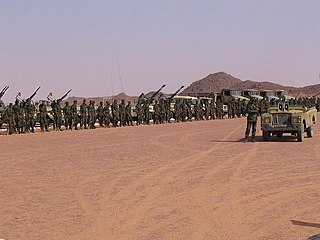
The Western Sahara conflict is an ongoing conflict between the Sahrawi Arab Democratic Republic/Polisario Front and the Kingdom of Morocco. The conflict originated from an insurgency by the Polisario Front against Spanish colonial forces from 1973 to 1975 and the subsequent Western Sahara War against Morocco between 1975 and 1991. Today the conflict is dominated by unarmed civil campaigns of the Polisario Front and their self-proclaimed SADR state to gain fully recognized independence for Western Sahara.

The foreign relations of the Sahrawi Arab Democratic Republic (SADR) are conducted by the Polisario Front, which maintains a network of representation offices and embassies in foreign countries.
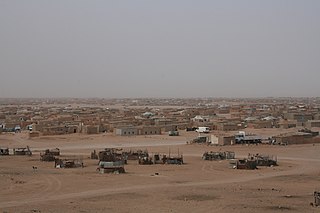
The Sahrawi refugee camps, also known as the Tindouf camps, are a collection of refugee camps set up in the Tindouf Province, Algeria in 1975–76 for Sahrawi refugees fleeing from Moroccan forces, who advanced through Western Sahara during the Western Sahara War. With most of the original refugees still living in the camps, the situation is among the most protracted in the world.

The Western Sahara War was an armed struggle between the Sahrawi indigenous Polisario Front and Morocco from 1975 to 1991, being the most significant phase of the Western Sahara conflict. The conflict erupted after the withdrawal of Spain from the Spanish Sahara in accordance with the Madrid Accords, by which it transferred administrative control of the territory to Morocco and Mauritania, but not sovereignty. In late 1975, the Moroccan government organized the Green March of some 350,000 Moroccan citizens, escorted by around 20,000 troops, who entered Western Sahara, trying to establish a Moroccan presence. While at first met with just minor resistance by the Polisario Front, Morocco later engaged a long period of guerrilla warfare with the Sahrawi nationalists. During the late 1970s, the Polisario Front, desiring to establish an independent state in the territory, attempted to fight both Mauritania and Morocco. In 1979, Mauritania withdrew from the conflict after signing a peace treaty with the Polisario Front. The war continued in low intensity throughout the 1980s, though Morocco made several attempts to take the upper hand in 1989–1991. A cease-fire agreement was finally reached between the Polisario Front and Morocco in September 1991. Some sources put the final death toll between 10,000 and 20,000 people.

Elkouria Amidane is a Sahrawi student and human rights activist. Elkouria Amidane has over the years conducted non-violent struggle for Western Sahara self-determination and demonstrated for Saharawi student's rights against Morocco. Elkouria Amidane was awarded the Student Peace Prize in 2009 for her work for human rights and the Saharawi people. Elkouria Amidane was awarded the Ordfront Democracy Prize at the Swedish parliament.

The 2011 Western Saharan protests began on 25 February 2011 as a reaction to the failure of police to prevent anti-Sahrawi looting in the city of Dakhla, Western Sahara, and blossomed into protests across the territory. They were related to the Gdeim Izik protest camp in Western Sahara established the previous fall, which had resulted in violence between Sahrawi activists and Moroccan security forces and supporters. The protests also purportedly drew inspiration from the Arab Spring and successful revolts in Tunisia and Egypt, although the Arab Spring proper did not reach Western Sahara.
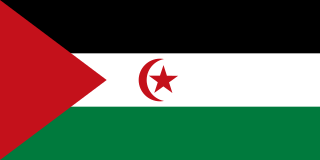
The Sahrawi Arab Democratic Republic, also known as the Sahrawi Republic and Western Sahara, is a partially recognized state, located in the western Maghreb, which claims the non-self-governing territory of Western Sahara, but controls only the easternmost one-fifth of that territory. It is recognized by 46 UN member states and South Ossetia. Between 1884 and 1975, Western Sahara was known as Spanish Sahara, a Spanish colony. The SADR is one of the two African states in which Spanish is a significant language, the other being Equatorial Guinea.

Women in the Sahrawi Arab Democratic Republic are women who were born in, who live in, or are from the Sahrawi Arab Democratic Republic in the region of the Western Sahara or the Sahrawi refugee camps. In Sahrawi society, the women share responsibilities at every level of its community and social organization. Article 41 of the Constitution of the Sahrawi Arab Democratic Republic ensures that the state will pursue "the promotion of women and [their] political, social and cultural participation, in the construction of society and the country's development".
Khadidja Hamdi is a Sahrawi politician and activist. She is one of two women ministers in the Sahrawi Arab Democratic Republic (SADR) Government and holds the post of Minister for Culture.
Najla Mohamed-Lamin is a Sahrawi human rights activist and teacher who focuses on women's rights and environment issues. She established the Almasar Library Centre, which educates women and children living in Sahrawi refugee camps about climate change.
















